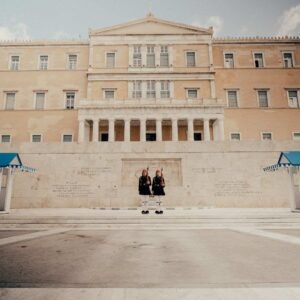The diplomatic spat ensued between Greece and Britain on Monday, when UK canceled a purposed meeting of their Prime Ministers following which the Greek Premier accused the British of attempting to thwart discussions on the Parthenon marbles
During Greek Prime Minister Kyriakos Mitsotakis’ visit to London, he was supposed to meet British PM Rishi Sunak at 10 Downing Street on Tuesday. He planned to ask for the return of ancient sculptures from the British Museum, a demand Greece has had for many years.

Later, he released a statement expressing his annoyance at the cancelation of the meeting with the British PM just hours before it was scheduled. The Greek PM also said that Greece’s position on the Parthenon sculptures was stern and that he had hoped to have a discussion on it in addition to other pertinent issues such as Gaza, Ukraine, Climate Change and immigration.
Britain had confirmed then that the two Prime Ministers would not be meeting and that Mitsotakis would instead be meeting with the Deputy PM Oliver Dowden. It was reported that that the Greek leader had turned down the invitation.
The British PM office later stated that UK- Greece relations were important and that they shared joint efforts in Middle East, Ukraine and NATO. However, there was no mention made of the Parthenon Marbles in this statement.
What are the Parthenon Marbles and why does Greece want them?
The Parthenon Marbles have been long contested by Greece for their ownership. The sculptures originally adorned the 2500 year old Parthenon temple on the Acropolis until they were removed in the 19th century by British diplomat Earl of Elgin. For the last two centuries, they have been displayed at the British museum in London.
About half of the marble artworks are in London, and the rest are in a special museum under the Acropolis in Athens. When Mitsotakis talked on British TV, he said it was like cutting the Mona Lisa in half, and this reportedly upset the British government.
The law does not allow the British Museum to give back the sculptures to Greece, but they are talking about other solutions, such as a long-term loan. Yet, the British Prime Minister’s spokesperson said on Monday that the UK government will not change its mind.
They think the museum is where the sculptures should stay because they were legally brought and are owned by the museum trustees. The government stands by this and does not plan to alter the governing law, as Max Blain, the spokesperson explained.
Mitsotakis had a meeting on Monday with the leader of the Labour Party, Keir Starmer. In response to the cancelation of the meeting between the British and Greek Heads, the Labour Party stated that if the PM can not meet with a European ally with whom Britain has important economic ties, it was evidence that he could not provide the serious economic leadership the country needed.











Comments 1